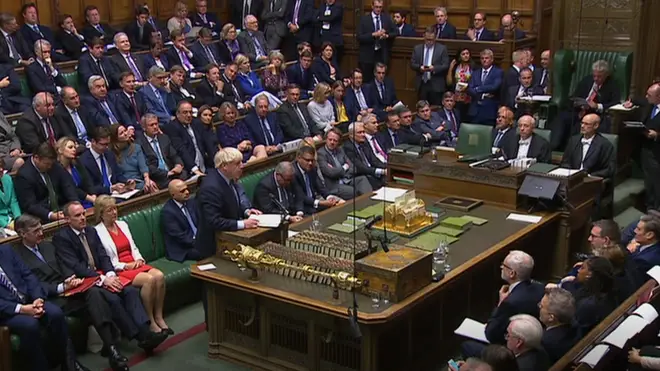
Ben Kentish 10pm - 1am
29 September 2019, 08:25
It is being reported that a Vote of No Confidence aimed at replacing Boris Johnson could be put forward by the SNP as early as next week - but how likely is it and how would it work?
Lord Norton of Louth, one of the world's leading authorities on Parliament, spoke to LBC presenter Clive Bull.
A Vote of No Confidence could be coming in the next few days, according to Lord Norton, "partly because the Prime Minister has said that if anybody puts a Motion of No Confidence down they will find time to debate it."
He added: "Traditionally, the convention has been that it's the only if the leader of the opposition who tables a Motion of No Confidence that time has been found quickly to debate it."
Lord Norton outlined two possible routes of a Vote of No Confidence and where it could lead.
One route, he outlined, is because of the Fixed Term Parliament Act (FTPA_. This route could lead to an early election. If the House passes a Motion of No Confidence and if no confidence is found within 14 days, an early election would be triggered.
"What's being talked about at the moment", he said, "is possibly moving a motion that expresses no confidence in the Government but not in the form of words stipulated by the FTPA".
He added: "So the Commons could demonstrate it has withdrawn its confidence from the Government but that would not trigger an early election because it's doesn't engage any provisions of the FTPA."

Lord Norton outlined that if the House expresses no confidence in the Government in whatever form, the Government cannot continue but it does not stipulate who would then take over.
He said: "Normally you would expect it to be the Leader of the Opposition" - Jeremy Corbyn.
But, he warned, at a time of such "political turmoil", it could be another more 'unifying' figure.
Clive asked: "Would Boris Johnson be forced to resign or could he carry on?"
Lord Norton responded: "Convention would be that the Prime Minister would be expected to resign but there's no formal requirement or statutory requirement."
He added: "That is governed by convention not by any formal rule that is enforceable."
It is perfectly possible, he said, that the Prime Minister could lose a Vote of No Confidence and then not resign.
This, he warned, could put the Queen in a very uncomfortable position and would be "complicated" and "highly embarrassing".
He outlined: "The position is that the Prime Minister remains the Prime Minister until such a time as the Prime Minister resigns. Formally, one serves at the pleasure of the sovereign. So, technically, the sovereign could dismiss a prime minister but in practice, in the era of modern British politics, that doesn't happen."